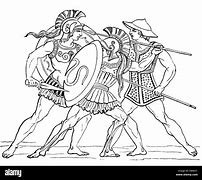I respectfully submit an excerpt from a truely historical masterwork by Donald Kagan, The Peloponnesian War, pp 217-218, Penguin Group, which is hauntingly appropriate for us who live two and a half-millennia later and face similar problems:
Party membership loyalty came to be regarded as the highest virtues, overshadowing all others and justifying the abandonment of all the restraints of traditional morality. Fanaticism and the treacherous intention to plot the destruction of an enemy behind his back were regarded as equally admirable: to recoil from either of these was to disrupt the unity of the party out of fear of the enemy: Oaths lost their meaning and became tools of duplicity.
This state of terror arose as a result of the personal greed, ambition, and lust for power, that typically emerge once factional war has broken out. While the leaders of each faction adapted a fine-sounding slogan—“political equality for the people”, for one, and “the moderate rule of the best” for the other–they resorted to any evil trick available to them, and even murdered those who belonged to neither party “either because they would not join them in the fight or out of jealousy that they should survive”. This new species of evil doing spread throughout the various states of the Greek world along with the revolutions “in general, the men of lower intelligence won out. Afraid of their own short comings and of the intelligence of their opponents so that they would not lose out in reasoned argument or be taken by surprise by their quick-witted opponents, they boldly moved into action. Their enemies, on the contrary, contemptuous and confident in their ability to anticipate, thought there was no need by action what they would win by their brains.
In sharp contrast to the restraint practiced by Nicostratus, his predecessor in Corcyra, the Athenian general Eurymedon, took no action for seven days, permitting the massacre to continue. Apparently, he agreed with Cleon and deplored the moderation that seemed to be both ineffective in itself and to encourage revolution. His appearance as commander at Corcyra revealed that the recently elected board of generals had by now taken office, and his behavior there suggests that a new spirit was gaining ground in Athens.
Note: That led to the abandonment of democracy by the Greek world as Athens caved in to adopt autocracy at the final, exhausting, end of the war that had lasted fifty years. The English poet Alexander Pope declared that party spirit “is but the madness of many for the gain of a few.”
George Washington echoed that message in his First Farewell Address, printed in the American Daily Advertiser on September 19, 1796—some 1400 years after the Greek debacle. Washington warned of the dangers of political factions to democratic republics throughout history. “I was no party man myself,” Washington wrote Thomas Jefferson, “and the first wish of my heart was, if parties did exist, to reconcile them.” Much could be achieved “by prudence, much by conciliation, and much by firmness.”
A stable, civil, society depends on resisting intolerant extremes. The Constitution did not mention political parties, and during the debate over ratification, James Madison and Alexander Hamilton praised the Constitution’s “spirit of moderation” in contrast to the “intolerant spirit” of “those who are ever so much persuaded of their being in the right in any controversy”.
“There are four things, which I humbly conceive are essential to the well being, I may even venture to say to the existence, of the United States as an independent Power:
1st An indissoluble Union of the States under one federal Head.
2ndly A sacred regard to public Justice.
3dly The adoption of a proper Peace Establishment—and
4thly The prevalence of that pacific and friendly disposition among the people of the United States, which will induce them to forget their local prejudices and policies, to make those mutual concessions which are requisite to the general prosperity, and, in some instances, to sacrifice their individual advantages to the interest of the community.”
-George Washington, Farewell Letter to Congress, June 8, 1783
“There is a natural and necessary progression from the extreme of anarchy to the extreme of tyranny,” Jefferson wrote in his Circular Letter to the States, March 26, 1786.
The United States of America has devolved into a pair of warring states based on inflexible party beliefs and actions, goaded on by partisan religious and social figures, and zealots, who are incompletely shut off from any different ideas other than their own.
This author predicts that America will reach the point that occurred in ancient Greece and has plagued all ensuing democracies. Please learn to work together, to be bipartisan, to recognize the good in other people and their ideas before we reach a point of no return.


